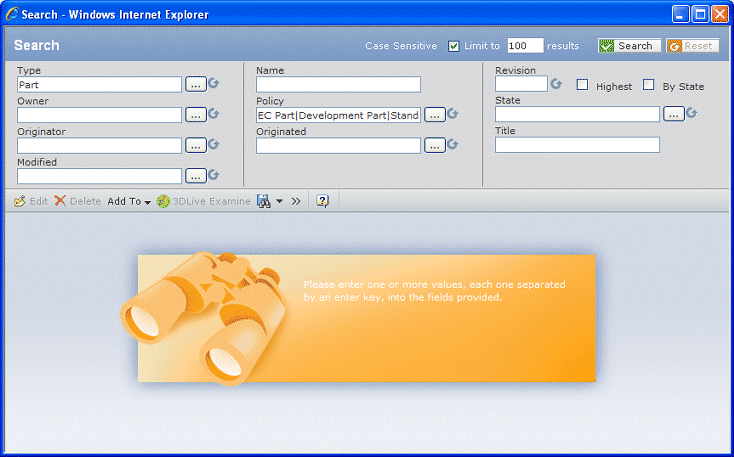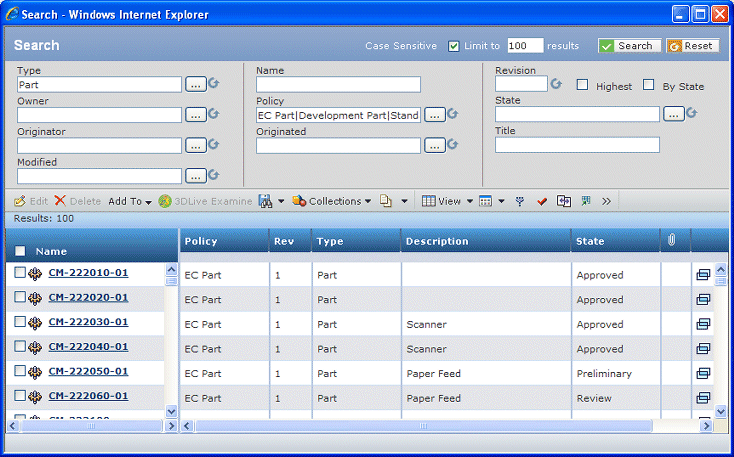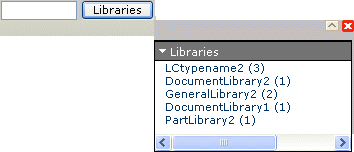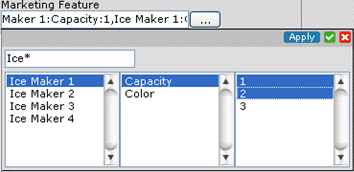Running an Advanced Search (Form Mode) | |||||||
|
| ||||||
From the global toolbar, select
 .
.
or
Select Add Existing from the page Actions menu or toolbar.
or
Click
 next to the field where you need to search
for a value.
next to the field where you need to search
for a value.or
Enter a search string in the Search box on the global toolbar and click
 .
.
If you entered search criteria, the search results show.
The top of the page lets you enter search criteria; the attributes in this section can be configured by your system administrator and may be different from this example. To switch to the navigation search page, click Navigation View. Not all search pages have this button.
Enter search criteria as explained in steps 3 to 7 and click Search.
You can click Search at any point when entering criteria to view an updated results list.

The bottom of the page shows the results list. Depending on where you initiated the search, the page may have criteria (types and attribute values) that you cannot change.
The Results value shows the number of objects found. The value may display like this: Results: 1000 of 89076.
If so, your system is configured to limit the number of objects returned. The total count (89076 in this example) is a predicted estimate. By using a prediction instead of an exact count, the results page loads faster.
See Search Results for description of the columns in the results section.
To select a specific library:
-
Click Libraries and the list of libraries pops
open. The Libraries search does not show on all search pages.

- Click the needed library.
- Click Search.
-
Click Libraries and the list of libraries pops
open. The Libraries search does not show on all search pages.
To filter the results list based on a collection, select Collections > and the name of the collection. The results list shows only those objects in the selected collection that meet the criteria.
To filter the search based on an attribute value:
-
Type the needed value. You can enter a comma-separated list of values.
or
-
Use the
 button to select from a list in the specific
field and:
button to select from a list in the specific
field and:
- If the attribute contains a range of values, a list box of values for that attribute pops open and you can click the needed value. Some attributes allow you to select more than one value.
- If the attribute contains dates you can enter the start and end dates for the search. Use the calendar tool to enter date values.
- If the attribute contains yes/no values, click the option button for Yes or No.
- If the attribute includes a unit of measure, enter a value and select the units.
-
Click
 to close the popup with
the selected value. You can enter values for as many attributes as needed.
If you selected a date range, a numeric range, or multiple values for
an attribute, a column for that attribute is added to the results table.
to close the popup with
the selected value. You can enter values for as many attributes as needed.
If you selected a date range, a numeric range, or multiple values for
an attribute, a column for that attribute is added to the results table.
If you defined a custom view for the results table, the column is only added if you had previously added it to the list of visible columns. If not, the system adds it to the list of available columns and you can edit your custom view to include it.
- Click Search.
-
Type the needed value. You can enter a comma-separated list of values.
To search for specific text in any attribute of an object:
When using the search field, your results include all objects that have that value for any attribute. For example, if you enter "Plastic*" in the full-text search field, the system finds all objects that include Plastic in any field. If you only want to find items that have a Material Type of Plastic, then search specifically on that field.
-
Type the keyword or text string in the Search box.
Your system has a minimum required number of characters (default is 3) when using a wildcard. For example, you can enter "Pro*" in the box, but not "Pr*". Your Business Administrator may have increased or decreased this minimum.
You cannot use a single wildcard character in a multiword query that has spaces between the words unless the wildcard appears at the end of the query. Use a second wildcard to balance the first wildcard. For example, the queries "the cow jumped" and "the cow jumped*" are valid and the queries "th* cow jumped" and "t*e cow jumped" are not valid.
- Click Search.
-
If you see a "Did You Mean" message, the search tool has found 1 or
more terms that are close to but more common than the one you entered.
Click a word or phrase to search for it.
The results list is updated to show objects that contain that text as any attribute value. The search is not case-sensitive and the results include all matches based on pieces of the given string. Non-alphanumeric characters are not recognized by the search engine.
-
Type the keyword or text string in the Search box.
To search combination fields (where the search attribute combines individual attributes, such as Configuration Feature):
-
Click
 .
.

- In the text box above the list boxes, enter search text. You can use the * and ? wildcards.
- Click a value in each of the list boxes.
-
Click
 .
.
- Click Search. The results are filtered based on the combination of attributes.
-
Click
To sort the search results, click the arrow next to a column name.
To save the search criteria, including the Type and Attribute selections:
-
Click
 > Save
As.
> Save
As.
- Enter a name for the search, or select an existing search to overwrite it.
- Click Done.
-
Click
To re-execute a saved search, click
 and click the name of
the search.
and click the name of
the search.
To clear all search criteria, click Reset.
To add selected items to a collection, click Collections, and then click:
- Add to Clipboard Collection. Adds the items to your clipboard collection.
- New / Add to Collections. Opens the Select Collection dialog.
Click Done.